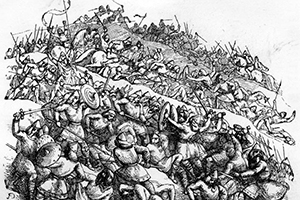
History-Periods
Past eras

From pre-history to today
Choose your period

Periods of History
explore the different eras

Certainly! The Battle of Ashdown was a significant battle fought during the Anglo-Saxon period of England, between the forces of King Ethelred of Wessex and his younger brother Alfred, against a Viking army led by the Danish King Bagsecg. The battle took place on January 8, 871, in the region of Berkshire, England, and it is considered a pivotal moment in the history of Anglo-Saxon England.
Background:
During the 9th century, England was a divided country, with several rival kingdoms vying for power and control over the land. In 865, a Viking army from Denmark led by the brothers Halfdan and Ivar the Boneless invaded England, beginning a period of sustained Viking attacks on the Anglo-Saxon kingdoms.
In response to the Viking threat, the Anglo-Saxon kingdoms formed an alliance and elected King Ethelred of Wessex as their leader. Ethelred had two younger brothers, Alfred and Aethelwold, who both played significant roles in the Battle of Ashdown.
The Battle:
The Viking army, led by King Bagsecg, had been raiding Wessex for some time, and they were camped on the top of a hill near Ashdown, in Berkshire. Ethelred and Alfred, with their army, approached the Viking camp and prepared for battle.
According to legend, Alfred and Ethelred argued about the best way to approach the Viking army. Ethelred wanted to wait for reinforcements, while Alfred urged his brother to attack immediately. In the end, Ethelred gave in to Alfred's impatience and ordered the attack.
The battle began with the Anglo-Saxon army charging uphill towards the Viking camp. The Viking army was caught off guard and disorganized, and the Anglo-Saxons were able to inflict heavy casualties. The fighting was intense, and it is said that the two sides fought for several hours without a clear victor.
During the course of the battle, Alfred and Aethelwold led a contingent of troops around the Viking flank and attacked them from the rear, while Ethelred remained at the front of the Anglo-Saxon army. This maneuver was successful, and the Viking army was eventually defeated, with King Bagsecg and many of his warriors being killed.
Aftermath:
The Battle of Ashdown was a significant victory for the Anglo-Saxon army, and it helped to establish Wessex as the dominant Anglo-Saxon kingdom. The battle also had a profound impact on the future of England, as it set the stage for the eventual unification of the country under King Alfred the Great, who was Ethelred's younger brother and a hero of the battle.
The Battle of Ashdown is also notable for being one of the earliest recorded battles in English history, and it has been the subject of many works of literature, including the Old English epic poem "Beowulf".
The Battle of Ashdown took place during a period in English history known as the Anglo-Saxon period, which lasted from the 5th century until the Norman Conquest in 1066. During this time, England was a collection of independent kingdoms, each with its own distinct culture and language.
One of the most significant literary forms of the Anglo-Saxon period was the epic poem. Epic poems were long narrative poems that told the stories of heroic deeds and battles, often featuring supernatural beings and otherworldly settings. These poems were typically composed and transmitted orally, and were performed by professional bards or scop (poet) in the halls of kings and nobles.
The most famous epic poem from the Anglo-Saxon period is "Beowulf", which tells the story of a hero who battles monsters and dragons to protect his people. "Beowulf" is considered one of the greatest works of English literature, and it is an important source of information about Anglo-Saxon culture and society.
Other notable epic poems from the Anglo-Saxon period include "The Battle of Maldon", which recounts the battle between the Anglo-Saxons and the Vikings in 991, and "The Battle of Brunanburh", which describes the Anglo-Saxon victory over a coalition of Viking and Scottish forces in 937.
In addition to epic poetry, the Anglo-Saxon period also saw the development of other literary genres, such as elegies, riddles, and religious poetry. The elegy was a mournful poem that lamented the passing of a loved one or the loss of a community, while riddles were short, playful poems that challenged the listener to solve a puzzle.
Religious poetry was also an important part of Anglo-Saxon literature, with many works focusing on Christian themes and teachings. One of the most significant religious works of the period was "The Dream of the Rood", a poem that tells the story of the crucifixion of Christ from the perspective of the cross itself.
Overall, the literature of the Anglo-Saxon period provides a rich and diverse portrait of the culture and society of early England, and it continues to influence modern literature and popular culture to this day.
If you have a suggestion regarding additional topics you would like to see included - please let us know
Reference: Article by Greg Scott (Staff Historian), 2024
